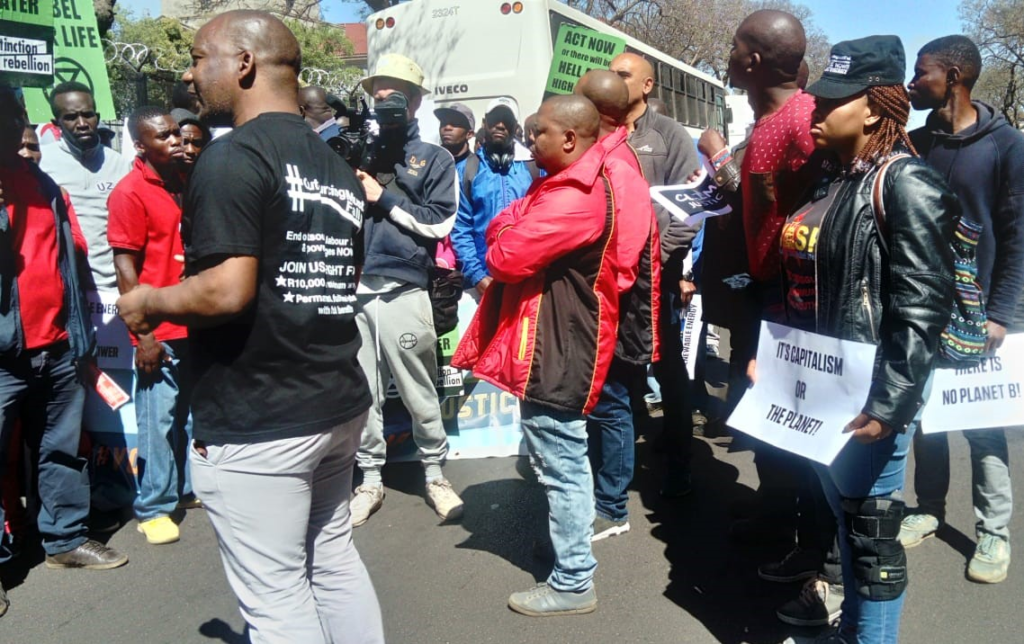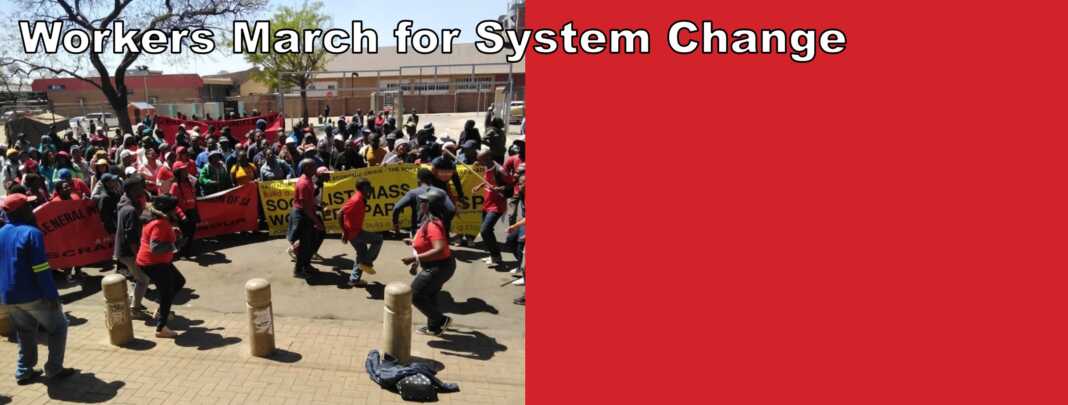Written by Ndumiso and Phemelo
Last week on Thursday morning about 150 workers from the pharmaceutical company Transpharm marched to the Department of Energy in Pretoria. The workers led a lively demonstration, singing energetically and toy-toying for hours. Most of the workers had come in support of the Union campaign on Climate and exhibited a high level of interest in the speeches that were delivered.
A company like Transpharm represents the state of medicine in South Africa where it is for-profit rather than matching the needs of people, which is why workers often complain that they cannot afford it. And with South Africa having serious health endemics of TB, HIV/AIDS, diabetes, heart diseases etc. it means the government has to use tax-payers money to purchase these medications. Also, the damage that these medications do the environment is hidden from people and workers are not educated on the impacts. The meat industry puts animals under heavy medication, such as hormones and antibiotics, and even animals that are not genuinely ill are put in horrible and unhealthy conditions to produce a lot of meat fast and cheaply. This builds the potential for superbugs, or antibiotic resistant bacteria that could potentially cause widespread epidemics. All this is happening while humans who are in need of medicine cannot afford them.

It was clear that marching workers, already frustrated by their employer’s unfair labour practices, were disappointed with their bosses’ utter disregard for the well-being of the planet. Additionally, it was obvious to the workers that the foul labour practices of reckless polluting and evading safety regulations are a way for the bosses’ to secure their profits. The workers easily made the link between the way the bosses treat the workers and the way they treat the environment. There was an apparent shock at the state of the world climate and its current and possible future effects on weather patterns, food production, increasing sea levels, and increasingly frequent natural disasters like floods and droughts throughout Sub-Saharan Africa.
Many workers, having experienced cruel treatment at the hands of capitalists and their government, also understood the disastrous implications of privatizing Eskom. This reassured their support of trade union opposition to these privatization plans. Furthermore, the workers found that profit-driven motivations of the big corporations come naturally, meaning electricity tariffs will continue to escalate while wages continue to stagnate, or even decline, leading to electricity becoming unaffordable for much of the working class. This will inevitably lead to more people resorting to the cutting of trees and burning wood for fuel thus adding more CO2 to the already fragile atmosphere.
As much as the march was a demonstration of trade union opposition to privatization of Eskom and climate change, it was also an open school for many workers who are frequently denied information and education on the science of climate change by the media and schooling system. By the end of the march, it became clear to workers that our planet is in danger for the same reasons they are on low wages. Capitalism is being exposed as the true force behind the exploitation of both the working class and the natural environment. The same relentless pursuit of profits that butchered the miners at Marikana leads us to a planet brimming with greed-induced disasters that threaten food supplies and render our homes unlivable. The workers were convinced of how big business treats the environment, that the instinct to preserve profits comes naturally with capitalists, and that this cannot go on.
The Department refused to accept the memorandum saying they were not notified in advance. The spirited demonstration of the workers, however, could not be ignored and clearly impressed the staff of the Department who came out to take pictures of the posters, banners and to listen to the chanting and toyi-toyi songs.

The power of big businesses must be stopped and workers need to take control of the economy. Only the workers can guarantee that businesses transition to renewable energy, to sustainable agriculture, and to an economy were the wealth produced by society serves the needs of society and not the wealth of the few. We can build more ambulances and we can certainly have decent wages, proper green housing plans, free education, shorter working hours and essential services for all.
WASP stands in solidarity with the Transpharm workers and workers worldwide in combating climate change and saving the planet from corporate greed. The demonstrations, if combined with many more mass education programmes on a more systematic basis, can lay a concrete foundation for a more organised mass intervention of the trade union movement in the Climate Change strikes and working class campaigns for a just transition to environmental justice worldwide. The trade union movement needs to organise the working class on a wider scale for a more organised mass intervention. An international revolutionary working class movement in communities must be built to campaign against climate change and force big business to transition to green technology and encourage small businesses to get government assistance for a just transition too. The only way to reverse climate change is through system change!




